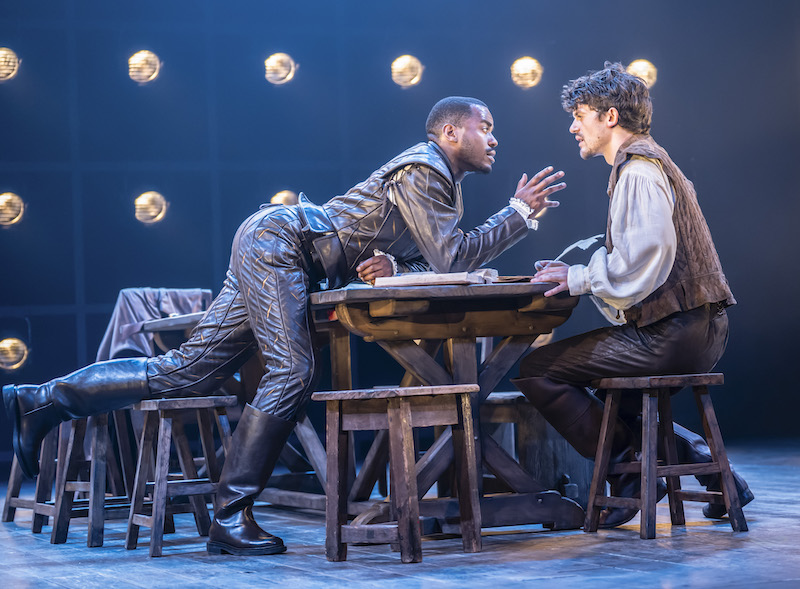Writer: Liz Duffy Adams
Director: Daniel Evans
Some scholars, with the help of computer analysis, now believe that Christopher Marlowe collaborated with William Shakespeare on Henry VI Parts 2 and 3. Recent editions of these plays even have Marlowe’s name, along with Shakespeare’s, on the title page. American playwright Liz Duffy Adams irrelevantly imagines what happened in the bards’ writing workshops.
However, it’s not just literary collaboration that Adams is interested in. There’s Marlowe’s own collaboration with the state, which, in a period of paranoia, sought to spy on everyone. Ncuti Gatwa’s flamboyant Kit makes no bones of his involvement in the triangle of surveillance with Robert Cecil, Walter Raleigh and the Earl of Essex, each quietly plotting from his own corner. And as Will tells us early on, “poets have big mouths.”
But when summoned to work on a play with Marlowe, can Edward Bluemel’s more earthy Shakespeare trust the esteemed writer, riding high after his success with Tamburlaine? Will worries that Kit is trying to entrap him. After all, Will has a Catholic family, and many Papists, along with atheists, are being served up to the state machine. Or is the lascivious Kit, with his direct come-ons and blatant coquetry, trying to snare Will for his queerness? Will can never trust his new writing partner, even – especially – when he’s on top of him.
With the censors checking every play, Will wonders how on earth Kit managed to stage Edward II, about, Will quips, “the king’s boyfriend”. Kit explains that his spying keeps him protected from charges of immorality. He’s not short of money either; his doublet eclipses Will’s dirty white shirt. Kit encourages Will to come over to the dark side.
Therefore, Adams’s Born With Teeth is a Will He/Won’t He kind of play. Will Will be drawn into the world of espionage, and will he be able to resist the unsubtle charms of Kit? And Adams has a lot of fun with it, and so do the two actors, on stage for 90 minutes without a break. Despite Kit’s coarseness, Gatwa is fairly irresistible as the writer who writes to live rather than Will who lives to write. Always flighty and flirty, Gatwa bounds around the stage, constantly sidestepping Will’s desire to get on and write. Gatwa is truly a man of a thousand faces, apt for such a man as mercurial as Marlowe.
In comparison, Bluemel’s Will is an innocent with fewer aspects to his character. His problem, he surmises later, is that he likes everyone, even the villains that he invents for his plays. And it’s clear that Will likes Kit, although he always retains an English sense of reserve that eventually holds him back. But when he obtains his own fancy doublet, Bluemel gives Shakespeare a more sinister edge, which would be nice to see more of.
The RSC’s Daniel Evans directs with verve, especially in his use of digital screens between scenes, and Joanna Scotcher’s set of light bulbs is chillingly effective, even if it does look a little like the inside of Ncuti’s old TARDIS. Scotcher’s costumes, however, are delicious.
In the final act, Adams draws parallels to the story of Christ, and here Will plays the part of Judas Iscariot, the doublet perhaps the equivalent of 30 pieces of silver. We don’t see Marlowe’s martyrdom in this bawdy hagiography, but he’s still allowed a final speech. And for those of us who declare that Marlowe was the better poet of the two men, Born With Teeth is very satisfying.
Runs until 1 November 2025
The Reviews Hub Star Rating
